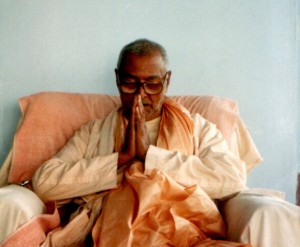ayi nanda-tanuja kinkaram
patitam mam visame bhavambudhau
krpaya tava pada-pankaja
sthita-dhuli-sadrsam vichintaya
“O son of Nanda Maharaja, I am Your eternal servant, yet because of my own karma, I have fallen into this terrible ocean of birth and death. Accept this fallen soul and consider me a particle of dust at Your Holy Lotus Feet.”
Illumination
By Sri Srila Bhakti Rakshak Sridhar Dev-Goswami Maharaj
 Here, Sri Chaitanya Mahaprabhu prays, “O Lord, please consider me; I want to enter into the realm of Your merciful glance. I do not know how to take proper care of myself, and so I invite Your care. Please accept me and give me entrance. You are my guardian. I want to live under Your protection.”
Here, Sri Chaitanya Mahaprabhu prays, “O Lord, please consider me; I want to enter into the realm of Your merciful glance. I do not know how to take proper care of myself, and so I invite Your care. Please accept me and give me entrance. You are my guardian. I want to live under Your protection.”
And who is He? We hear of different conceptions of God, but here we have come to a beautiful conception of God—Krishna, the son of Nanda Maharaja. This is found only in Vrndavana.
A great spiritual scholar, Raghupati Upadhyaya, once met Sri Chaitanya Mahaprabhu near Mathura. There, they had a discussion and Mahaprabhu asked him, “Whom do we want to have as our master? Who is the final goal of our life?” Raghupati Upadhyaya answered:
srutim apare smrtim itare
bharatam anye bhajantu bhava-bhitah
aham iha nandam vande
yasyalinde param brahma
“Those who fear rebirth in this world may follow the advice of the Vedic scriptures—others may follow the Mahabharata—but as for me, I follow Nanda Maharaja, in whose courtyard the Supreme Absolute Truth plays as a child.”
In the system of varnasrama-dharma, Vedic social duty, the people in general are under the guidance of the smrti, Vedic law. In this way, they are engaged in bodily duties with a color of godliness. Those who are free from physical demands, however, who are trying to transcend this life of enjoyment and exploitation, generally take their guidance from the Upanisads because higher advice is given there. Raghupati Upadhyaya says, “I don’t care for all these things, but I feel a need to follow the guidance of my heart. I am not so much concerned with the brain; I consider that real peace has its connection with the heart. And my heart is always attracted by Krishna’s father, Nanda. Krishna is said by authorities to be the Supreme Absolute Truth, and that absolute is crawling in the courtyard of Nanda Maharaja, so I see concrete reality there.”
How has Nanda attracted the Supreme Absolute Truth? In the Srimad Bhagavtam (10.8.46), the devoted King Pariksit Maharaja asks the boy saint Sukadeva Goswami:
nanda kim akarod brahman
sreya evam mahodayam
yasoda cha maha-bhaga
papau yasyah stanam harih
“O knower of Brahman, you are always merged in the exclusive conscious world. No trace of any mundane objective reverence can be found in you, for you are always engaged in the subjective world of spirit. Never is your consciousness thrown towards this objective world of ours. And you say that Krishna is the Supreme Absolute Truth. I ask one question of you, my master: what duty did Nanda discharge, what sort of realisation did Nanda have that the Absolute Truth is so intimate with thim that He appears as Nanda’s son and craws about in his courtyard? He seems to be under Nanda’s clutches. What is this? This is a most wonderful thing. Is it possible?
The Supreme Substance Sucks Her Breast?
“The yogis, the rsis, the great scholars and penance-makers say that they sometimes have a rare peek into their object of aspiration and realisation, and then they come back suddenly. They can’t keep their attention in that plane for long periods of time. How is it possible that the Supreme Substance sits on the lap of Yasoda and sucks her breast? If such things are real, if it is at all possible, then why should I not be attracted by that method by which I can have some much intimacy with the highest entity?”
In his prayer, Raghupati Upadhyaya expresses a similar ego. He says, “I don’t want to be entangled in the subtle discussion and analysis of the scriptures; I just want to surrender myself to Nanda and his party. I want to enlist my name in the group where Nanda is the master guide.” By the exercise of energy (karma), we can attain a good destination; without faith in the achievements of karma, we may try for salvation by raising our consciousness (jnana). But if we inquire into the solution of life with the help of the experts of that higher spiritual realm like Nanda and his party, we can enter into the land of love and dedication.
My faith, my common sense about religion, tells me that if I see that Supreme Absolute Truth who is so rare and find Him real, concrete, and intimate, appealing directly to my heart, then why should I engage myself in wild-goose chasing? I shall appeal directly to the object of my search. If someone tells me that a hawk has snatched my ear, should I chase the hawk without first touching my ear to see if it is still there? If I can have the Absolute Truth so intimately, why should I allow myself to run hither and thither? If I find that the Absolute Truth has kindly come with all His charm, and that His charm is not a secret and many personages are being attracted by Him, then should I run after the phantasmagoria of the the meditationists, the abstractionists and renunciationists? Never.
It is common sense. The straight understanding is given by authorities that Krishna, the son of Nanda, is Supreme. So when we have come up to that standard, then we can ask, “O son of Nanda, Krishna, king of the country of love: I appeal for Your affection. I am Your servant. I feel within myself that I have some connection with You. I am subordinate to You, but somehow, I am in adverse circumstances. I feel that there are so many enemies within me that are trying to take me away from You that I can’t give my attention to You all the time. At the same time, I feel from the inner plane of my heart that You are my master, You are all in all to me. My heart won’t be satisfied without your companionship. So I appeal to you: I am under unfavorable circumstances; I am suffering, and without Your grace, I don’t find any means of relief from my present imprisoned position.”
The Soul-Like a Ray of Sun
Here it is said, “I feel that I am not eternally connected with You; if it were so, then this separation would have been impossible. Unlike an avatara, I am not Your plenary portion.” Other incarnations of the Supreme Lord are plenary expansions of Him (svamsa), but the jiva is a partial representation of His potency (vibhinnamsa). In Bhagavad-gita, Krishna says that the living entities are His eternal parts and parcels. The soul comes from marginal potency (krsnera tatastha-sakti, bhedabheda prakasa). And the soul is an atomic fragmental part of the Lord’s potency like a ray of the sun. But here, the devotee prays, “I’m not part and parcel of Your own body, I’m not even a ray, but my representation is nearer to that of a particle of sand, a particle of dust—not even a particle of the ray coming out of the luster of Your body.”
In this way, Sriman Mahaprabhu is representing on our behalf that our petition must be of this type: “I cannot indulge myself in thinking that I possess such fortune that I may be considered an inseparable part of You. I am a separable part, but I also want Your grace. Please be kind upon me; I invoke Your mercy for a special grant. Accept me in any position in Your connection—even the lowest position. At least this must be sanctioned. Consider me a particle of dust at Your feet. This is my prayer.”
Back to Siksatakam >>>
Next Illumination >>>
